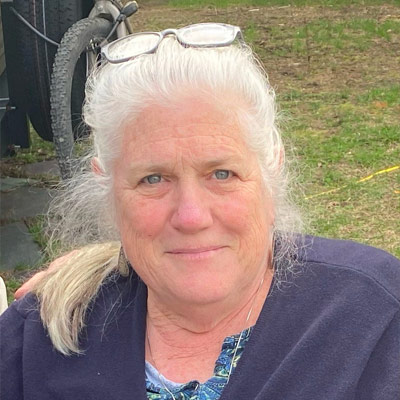Anne Rinard was born and raised in Pennsylvania and currently lives in Maine. Her early years were filled with far-flung adventures. She met her husband on a summer mission trip to Europe. "We wrote letters back and forth for two years. We actually got engaged by mail!" Anne explains. They married and then went back with the same mission group to live on a ship for two years, selling educational and Christian literature.
Once back in the States, the couple moved to Philadelphia and began a family. As their oldest child was about to start kindergarten, Anne was denied the opportunity to observe a class. So she decided to homeschool instead. "I wasn’t too sure about homeschooling, but I figured, 'How can you mess up kindergarten?' So, I started homeschooling, and it lasted for 25 years."
A few years ago, Anne was diagnosed with age-related macular degeneration. Her mom as well as a good friend also had been diagnosed with the disease, so she was familiar with it. “I knew what macular degeneration was, and I wasn't overly worried about it,” she recalls.
Over time, though, Anne has found the need to make some adjustments. When she started noticing more significant differences in her vision—trouble reading the clock, for instance—she went back to her retina specialist and began a regime of frequent injections.
Another adjustment came when Anne realized she no longer felt safe behind the wheel. "Once I realized that I couldn’t see the red light anymore and that the road just seemed to disappear under certain light conditions, I just decided to stop driving," she remembers.
In addition to making the changes she needs, Anne has been motivated to find organizations and people who can help. A local vision rehab agency in Maine has been incredibly valuable. "They helped with occupational therapy. And, in fact, they were the ones who told me about Hadley," she recalls.
One of Anne’s favorite things on the Hadley website is our Insights & Sound Bites podcast. She also loves how simple and clear the workshop videos are. "I can see what they're doing!"
When thinking about adjusting to her vision loss, Anne observes "Every time I lose some vision, it's almost like starting all over. So, I'll adjust to the level of vision that I have, and then I'll be doing okay, and then I lose more, and I start tripping or falling or walking into trees. It can be discouraging."
Anne found the emotional toll from adjusting and then adjusting again to increased loss to be exhausting. “I was getting to be harsh toward myself and how hard I was finding the emotional adjustment. So, I reached out to Hadley for a peer who could relate and maybe help me with this, too.”
Now Anne is part of Hadley's peer program and she's found the connection both enjoyable and extremely helpful. For example, recently Anne’s mother was hospitalized, and Anne needed to take the train from Boston to Philadelphia. She was worried about being able to do it on her own. She texted her peer, Linda, in a panic asking her how she should approach this trip. Linda responded with confidence and calm, reminding Anne to take a deep breath and go slow. "She talked me through it," Anne says. "She was a godsend.”
Later that same week, while Anne was helping her mom recuperate, she reconnected with Linda saying, "I'm pointless here. Because I can't drive, I can’t help.'" In response, Anne was expecting a comment like "Oh, I know that’s really hard." But instead, Linda replied in a firm voice, "Nope, you can't drive. Let it go. That's not for you anymore. Give that to somebody else. What can you do?"
That was just the advice that Anne needed. "Linda helped me realize that I needed to focus on what I could still do and know that there is value in that," Anne reflects. And she did indeed find things she could do to be helpful to her mom.
That conversation opened a door for Anne. "It was for me a realization that, while vision loss is happening to me, I still have choices. I still have some control. It was huge for me."
